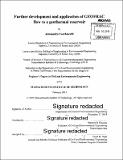| dc.contributor.advisor | Herbert H. Einstein. | en_US |
| dc.contributor.author | VecchiarelliI, Alessandra | en_US |
| dc.contributor.other | Massachusetts Institute of Technology. Department of Civil and Environmental Engineering. | en_US |
| dc.date.accessioned | 2015-07-31T19:10:43Z | |
| dc.date.available | 2015-07-31T19:10:43Z | |
| dc.date.copyright | 2015 | en_US |
| dc.date.issued | 2015 | en_US |
| dc.identifier.uri | http://hdl.handle.net/1721.1/97979 | |
| dc.description | Thesis: Civ. E., Massachusetts Institute of Technology, Department of Civil and Environmental Engineering, 2015. | en_US |
| dc.description | Cataloged from PDF version of thesis. Page 174 blank. | en_US |
| dc.description | Includes bibliographical references (pages 169-173). | en_US |
| dc.description.abstract | GEOFRAC is a three-dimensional, geology-based, geometric-mechanical, hierarchical, stochastic model of natural rock fracture systems. The main characteristic of GEOFRAC is that is based on statistical input representing fracture patterns in the field in form of the fracture intensity P₃₂ (fracture area per volume) and the best estimate fracture size E(A). Recent developments in GEOFRAC allow the user to calculate the flow in a fractured medium. For this purpose the fractures are modeled as parallel plates and the flow rate can be calculated using the Poisseuille equation. This thesis explores the possibility of the application of GEOFRAC to model a geothermal reservoir. After modeling the fracture flow system of the reservoir, it is possible to obtain the flow rate in production. A parametric study was conducted in order to check the sensitivity of the output of the model and to explain how aperture, width and rotation (orientation distribution) of the fractures influence the resulting flow rate in the production well. A case study is also presented in this thesis in order to confirm the applicability of GEOFRAC to a real case. GEOFRAC is a structured MATLAB code composed of more than 100 functions. Examples on how to obtain P3 2 and E(A) from fracture trace lengths on outcrops are presented in the Appendix 1. A GUI was created in order to make GEOFRAC more accessible to the users. It should also be kept in mind that future improvements are the keys for a powerful tool that will let GEOFRAC to be used to optimize the location of the injection and production well in a geothermal system. | en_US |
| dc.description.statementofresponsibility | by Alessandra VecchiarelliI. | en_US |
| dc.format.extent | 174 pages | en_US |
| dc.language.iso | eng | en_US |
| dc.publisher | Massachusetts Institute of Technology | en_US |
| dc.rights | M.I.T. theses are protected by copyright. They may be viewed from this source for any purpose, but reproduction or distribution in any format is prohibited without written permission. See provided URL for inquiries about permission. | en_US |
| dc.rights.uri | http://dspace.mit.edu/handle/1721.1/7582 | en_US |
| dc.subject | Civil and Environmental Engineering. | en_US |
| dc.title | Further development and application of GEOFRAC flow to a geothermal reservoir | en_US |
| dc.type | Thesis | en_US |
| dc.description.degree | Civ. E. | en_US |
| dc.contributor.department | Massachusetts Institute of Technology. Department of Civil and Environmental Engineering | |
| dc.identifier.oclc | 914173623 | en_US |
